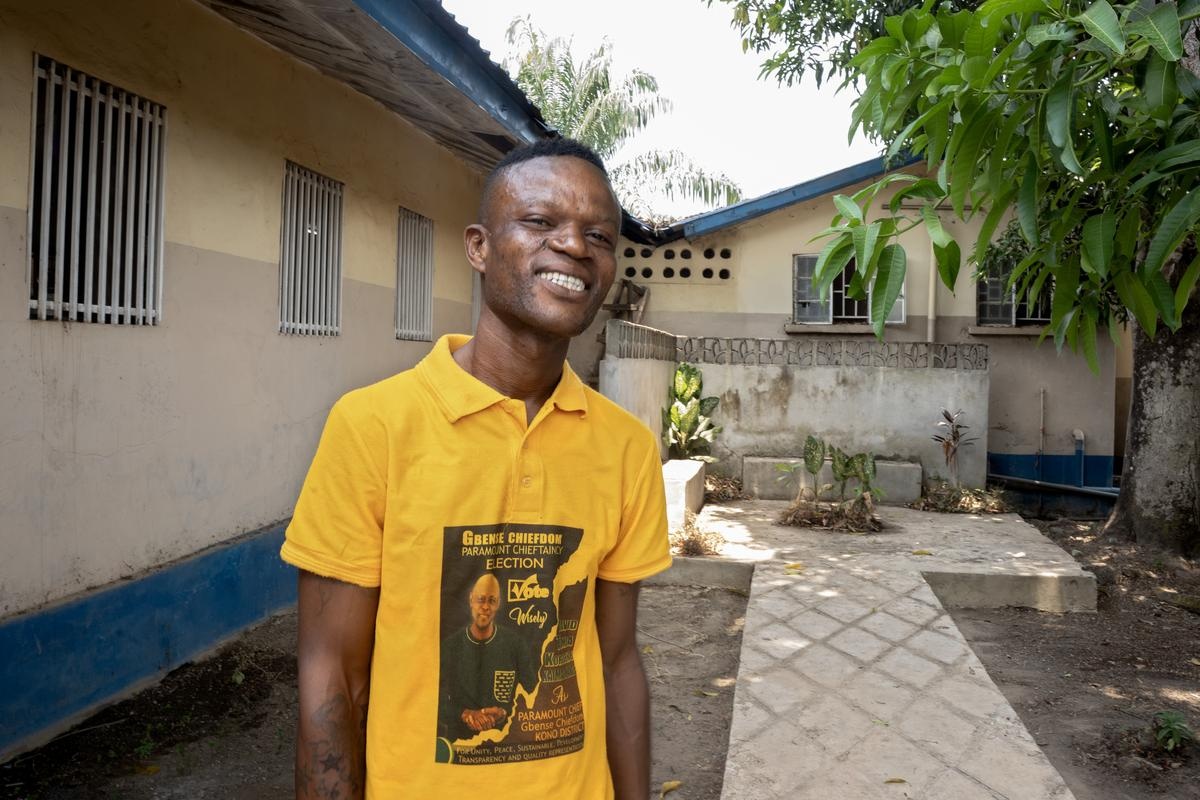In Sierra Leone, PIH Provides Mental Health and Substance Abuse Treatment During National Emergency
Abdulai, 28, sought care for drug abuse in 2019. Today, he’s in recovery and aspires to become an entertainer.
Posted on Jul 9, 2024

As the synthetic drug kush spreads across Sierra Leone, Partners In Health (PIH)-supported Koidu Government Hospital (KGH) continues to see an uptick in patients seeking addiction support. In recent months, many teens and adults have sought emergency care, mental health services, and other assistance due to the highly addictive drug, which is a mix of drugs including, but not limited to cannabis, fentanyl, and tramadol.
The rise in kush and overall drug abuse prompted the country’s president to declare a national emergency on substance abuse in April, leading to the establishment of a national task force. At KGH, staff across the facility are working together to holistically treat patients with co-occurring substance use disorders and mental health disorders, such as 28-year-old Abdulai.
While regularly using kush, marijuana, and alcohol, Abdulai’s behavior started to change and he began having frequent outbursts, which led to being stigmatized by his community. Self-realization led him to first seek help in 2019. Since then, he’s received ongoing care at KGH, the only government hospital in rural Kono District.
“The hospital has given me advice, counseling, and psychosocial education. Anytime I come to the hospital, my medicine is available and free,” Abdulai says. “In addition to the medicine, the psychoeducation, counseling, and advice I receive is most helpful.”
Education has been a powerful tool in raising awareness and reducing stigma around mental health conditions and treatment. In between hospital visits, a community health worker (CHW) visits Abdulai at his home to check in on him and ensure he’s staying well.
“The CHW visits me twice a week and helps to build me up and encourage me,” says Abdulai.
Many patients with substance use disorders experience co-occurring mental health disorders, such as anxiety disorders or personality disorders, that also need treatment. However, having both a substance use disorder and mental disorder does not mean one caused the other, as noted by the National Institute of Mental Health.
At KGH, 80% of patients who receive treatment for substance abuse are also diagnosed with a mental health disorder.
Extensive Care, Resources
KGH’s mental health unit addresses substance abuse, including kush use, by providing psychosocial education in the community while highlighting the detrimental effects of using substances. In the hospital, the unit uses an evidence-based program called Common Elements Treatment Approach (CETA), which combines treatments for many conditions, including depression, anxiety, substance abuse, trauma and stress-related disorders. After assessing a patient’s symptoms, individual therapy is offered, and if necessary, medicine is prescribed. Simultaneously, mental health is addressed through psychotherapy, and social support including stipends for transportation, food to help with taking medication, and housing assistance.
Under PIH’s guidance in 2019, Clinical Psychiatrist Dr. Mawuena Agbonyitor trained Community Health Officer (CHO) Cathy Conteh—who oversees KGH’s mental health unit— and other CHOs in how to assess, diagnose, and support patients experiencing a mental health crisis. This training also extended to CHWs who began outreach efforts to identify people in need of mental health support. From 2019 to June 2024, there was an 80% increase in patient care with a 70% success rate. Success means patients adhere to medication, are receptive to treatment, and are successfully reintegrated back into their families and the community.

The current mental health team in Kono District includes 14 CHWs and four CHOs, who support KGH and Wellbody Clinic. The country’s first mental health helpline is managed by a team of six, including two psychosocial rehabilitation technicians, one assistant, and three counselors. For calls related to substance abuse, the team utilizes the CETA approach and refers patients to the hospital for in-person treatment.
Dispelling Myths, Providing Hope
A major challenge for the unit has been shifting the misconceptions of mental health that exist in Sierra Leone. Many conditions are attributed to the belief that mental illnesses are caused by spiritual or demonic forces and cannot be managed in a hospital. Community engagement initiatives led by the CHWs, including health talks, interactive radio shows, and informative media campaigns, aim to destigmatize mental health issues and promote hospital-based care. The health talks and outreach efforts create a space for community members to ask questions and serve as a referral pathway to KGH’s mental health unit.
Abdulai is still occasionally stigmatized by his community but overcomes it by educating people on the facts about mental health.
“The [friends] that are aware of my illness are supportive of my recovery. Since I have learned about the signs of mental health illnesses, I encourage my friends who are struggling to go to the hospital or call the mental health helpline,” says Abdulai.
Stigma persists for clinicians, too; however, staff remain committed to providing lifesaving care.
“Although I have been stigmatized for working in the unit, I love changing individuals,” says Conteh. “Most times seeing someone in crisis, you don’t know immediately if the patient will improve with the medicine they are given. But with follow up and continued support, individuals [can] recover and thrive. That is the most enjoyable part of it.”
Conteh has seen firsthand, through Abdulai and others, how patients can recover. When she first met him, Abdulai was aggressive, violent, and not ready to talk to staff, says Conteh. Now, Abdulai calls Conteh for guidance and support. “I am proud of how far he has come,” she says.
Reflecting on his experience with the mental health team, Abdulai says: “The mental health program is one of the best. Coming here motivates me and I can think clearly. I have a future now. I want to practice music and become an entertainer.”

